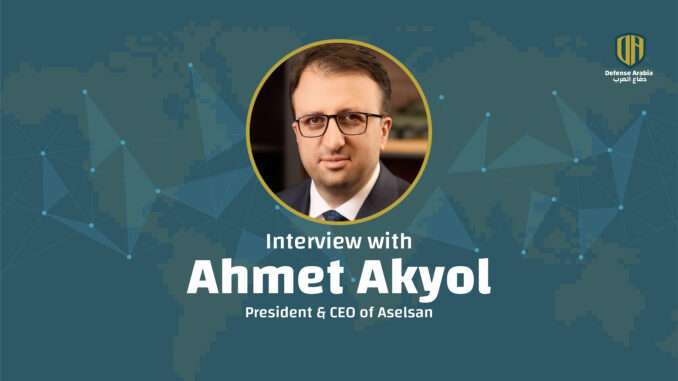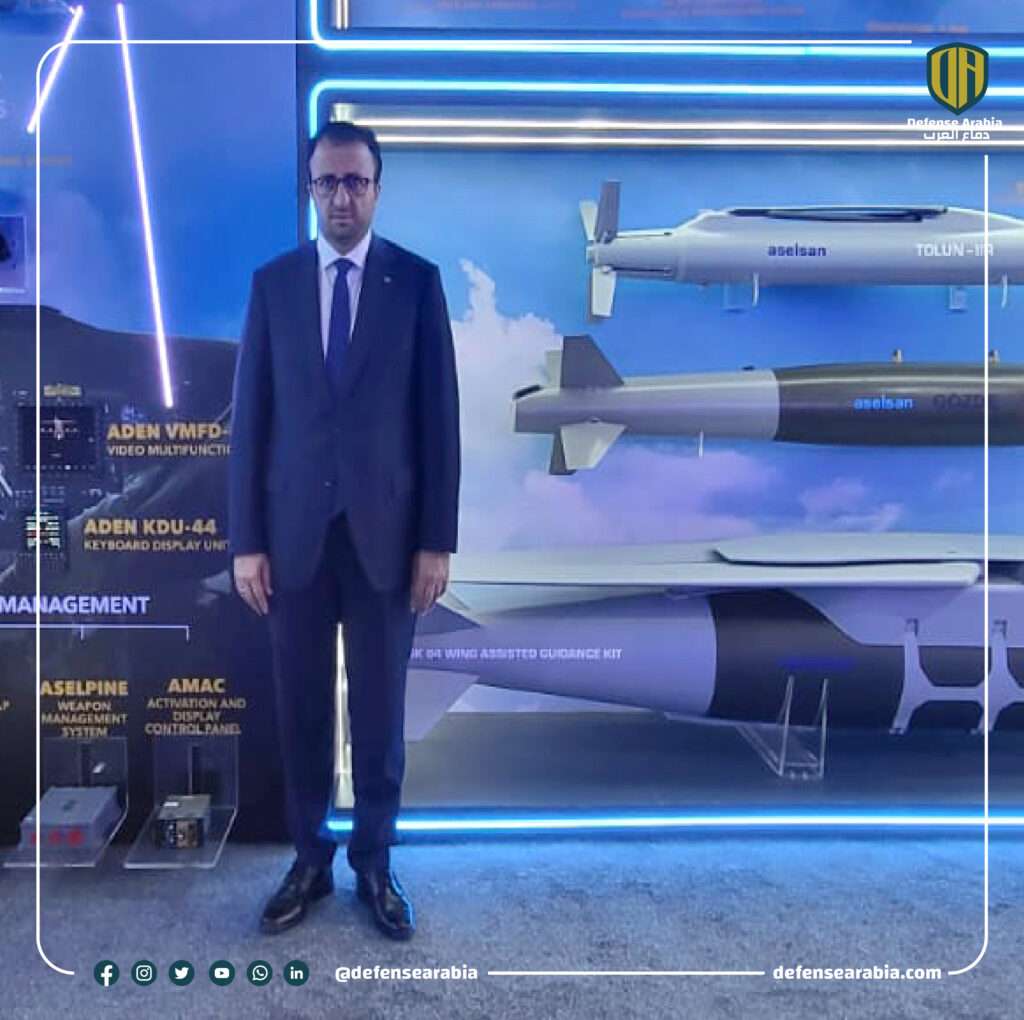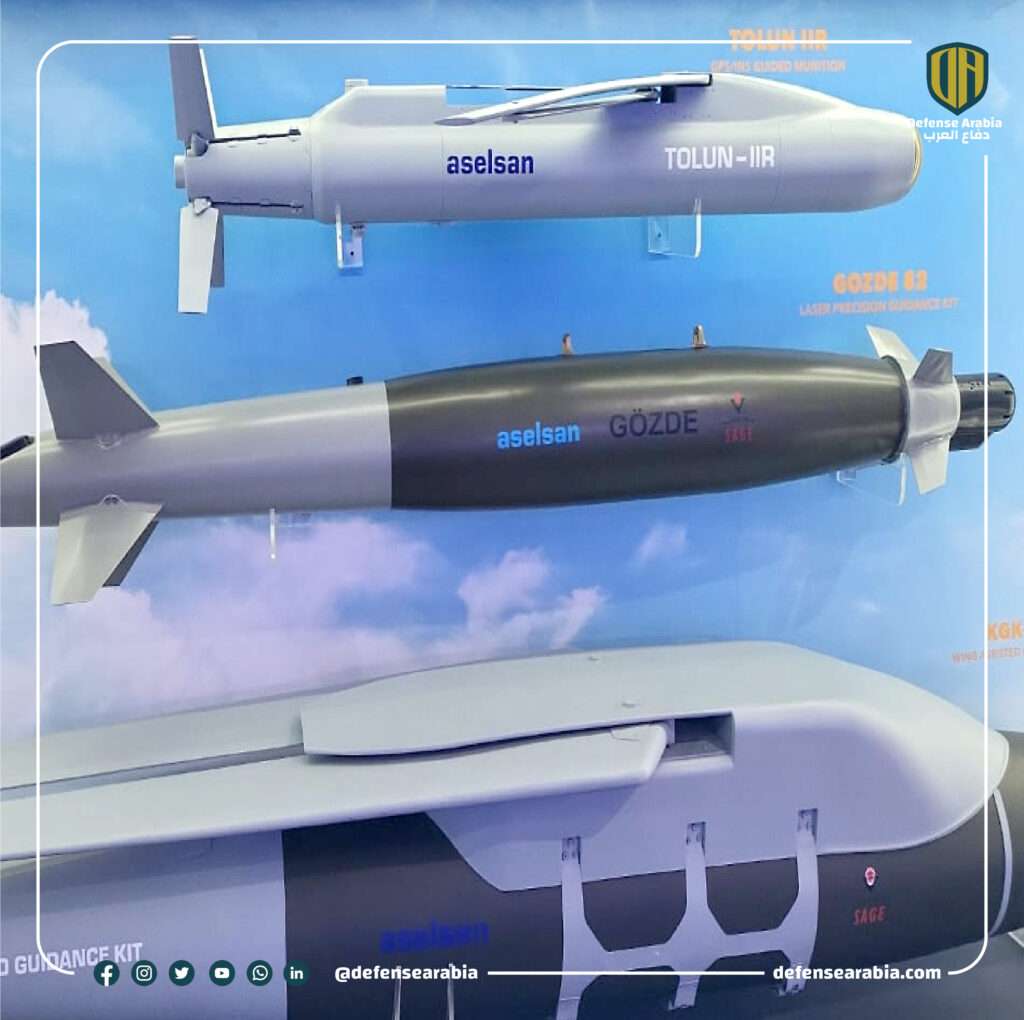
In a recent interview with Defense Arabia, Mr. Ahmet Akyol, the President and CEO of Aselsan, provided an in-depth look at the company’s strategic vision, technological advancements, and market presence. Established in 1975, Aselsan has evolved from a radio equipment manufacturer into a global leader in defense electronics. Mr. Akyol discussed Aselsan’s long-term strategy, which focuses on expanding its international footprint and diversifying its product portfolio.
He detailed Aselsan’s adaptation to the rapidly changing defense technology landscape, emphasizing the integration of AI, cybersecurity, and unmanned systems into their operations. Mr. Akyol also highlighted the company’s impressive rise in the Defense News Top 100 defense companies, attributing this success to a strategic focus on high-end technologies and substantial R&D investments.
The conversation then turned to specific products, including the innovative TOLUN Guided Munition and the GÖZDE guidance kit, which exemplify Aselsan’s commitment to cutting-edge, cost-effective solutions. Mr. Akyol provided insights into the technical capabilities of the Steel Dome missile defense system and the company’s strategic priorities for expanding its global reach, particularly in North and East Europe, North Africa, the Far East, and Central Asia.
Through this interview, Mr. Akyol sheds light on Aselsan’s ongoing efforts to strengthen its position as a major player in the global defense industry while continuing to address the evolving needs of its international clients.
Here’s how the interview unfolded:
Defense Arabia: Could you elaborate on Aselsan’s long-term strategy and vision, particularly in terms of expanding its global footprint and diversifying its product portfolio?
Mr. Ahmet Akyol: Aselsan, established in 1975, initially focused on producing radio equipment. Over time, we evolved into a defense electronics company to meet the needs of the Turkish Armed Forces. Today, Aselsan has transformed into an international entity, providing systems to allied countries around the world. Currently, we have customers in 88 countries worldwide and over 500 products in all domains from submarine to the space.
Looking ahead, our goal is to expand our international collaborations further. Recently, we restructured our international business and are increasing our partnerships with other entrepreneurs. For example, I attended the opening ceremony of Aselsan Balkans in Skopje just two days ago, and visited Indonesia last week to work on expanding our presence there. We recently opened an office in the United Arab Emirates and reactivated our operations in Saudi Arabia. We now have international offices globally and are actively training staff worldwide.
This year, we launched the Aselsan Transformation and Development Program. Its main aim is to enhance our international collaborations and position Aselsan among the top 30 defense companies by 2030. Currently, we are ranked 42nd, and this year our growth rate in defense has been remarkable. Our broad product portfolio, from aircraft electronics to naval and land systems, is a key strength.
Defense Arabia: How is Aselsan adapting to the evolving landscape of defense technology, including AI, cybersecurity, and unmanned systems?
Mr. Ahmet Akyol: We view AI as a general-purpose technology rather than a niche area. At the beginning of this year, we developed an AI strategy and began integrating AI into all Aselsan procedures and technologies. AI is now a fundamental part of our equipment development and internal processes, including supply chain management and business development.
Our AI-driven approach is part of a broader transformation that includes digitalization and agile procedures. An internal ethics committee oversees the use of AI to ensure proper implementation. In addition, we are heavily investing in unmanned systems, including unmanned aerial vehicles (UAVs), ground vehicles, and underwater vehicles. Our investment in these systems is growing as we compete with manned systems.
Defense Arabia: What key factors contributed to Aselsan’s significant rise in the Defense News Top 100 defense companies this year?
Mr. Ahmet Akyol: Our rise can be attributed to several key factors. First, we focus on game-changing technologies. Over the last two years, we have streamlined our product offerings, concentrating on high-end, advanced technologies. This focus has paid off as we now see the fruits of our extensive R&D investments. For instance, in just a few years, we have made significant strides in helicopter systems, UAVs, and other defense systems.
Additionally, Aselsan’s growing international reputation has attracted a diverse range of international customers. Our commitment to high-quality, advanced technology and successful product development has significantly improved our standing in the industry.


Defense Arabia: Could you elaborate on the unique features of the TOLUN Guided Munition and its operational effectiveness?
Mr. Ahmet Akyol: The TOLUN Guided Munition is a gliding munition, not missile-based. It operates without an engine, which allows it to achieve a range of over 100 kilometers purely through gliding. This capability is revolutionary, especially for targeting air defense systems, as it provides a significant range advantage without the need for propulsion.
Additionally, multiple TOLUN munitions can be deployed simultaneously from one aircraft—up to eight units at a time. They can be directed to a single target using different trajectories and waypoints due to our advanced release unit. The TOLUN comes in three types: fragmented, metal, and IR-seeking warheads. These munitions are designed to be used with both fighter jets and UAVs.
The TOLUN’s high range and versatility make it a game-changing ammunition type, effective against a variety of targets. It boasts precise targeting capabilities, even in challenging conditions. Feedback from battlefield operations indicates that it provides high accuracy, with a precision of less than 10 meters.
Defense Arabia: What are the advantages of using the GÖZDE guidance kit to convert unguided bombs into precision-guided munitions?
Mr. Ahmet Akyol: In precision-guided munitions, there are two main approaches: integrated systems and guidance kits. The GÖZDE guidance kit is a modular solution that converts unguided bombs into precision-guided munitions. This approach allows for cost-effective upgrades by integrating guidance kits with existing bombs.
The GÖZDE kit includes versions with laser guidance, INS guidance, and a combination of both. For laser-guided versions, precise target designation is required, but in adverse weather conditions, this might be challenging. INS guidance, on the other hand, uses GPS and does not require line-of-sight designation, making it effective in various conditions. The combination of INS and laser guidance in the GÖZDE system offers high precision even for moving targets.
Defense Arabia: Could you provide a more in-depth analysis of Aselsan’s market penetration in the Middle East and North Africa, including key partnerships, challenges, and opportunities?
Mr. Ahmet Akyol: Aselsan has a strong presence in the Middle East and North Africa, built over many years through successful technology transfer projects and joint ventures. We have established local production facilities and maintained a reputation for delivering not only solutions but also support for local manufacturing.
Our cultural familiarity with the region enhances our ability to train and collaborate effectively. We are expanding our presence with new agreements and partnerships, particularly in Egypt and other North African countries.
Defense Arabia: What are Aselsan’s strategic priorities for expanding its global reach, and which regions or countries are seen as particularly promising for the future?
Mr. Ahmet Akyol: Our strategic priorities for global expansion include focusing on regions such as North and East Europe, North Africa, the Far East, and Central Asia. Our approach involves forming joint ventures, establishing local production facilities, and developing maintenance, repair, and overhaul (MRO) services in these regions. This strategy allows us to serve customers directly and build strong local partnerships.
Defense Arabia: Can you describe the technical capabilities and operational principles of the Steel Dome air defense system?
Mr. Ahmet Akyol: The Steel Dome missile defense system integrates various components including radar, command and control, and electronic support systems to provide comprehensive air defense. It features RF and IR seekers, navigation systems, and subsystems for airspace control. The system is capable of engaging targets from 1 kilometer to over 100 kilometers away.
We have combined separate technologies into a unified concept, thanks to the leadership of the Turkish government. The system includes high-power microwave and laser weapons for direct engagement and is supported by missile providers such as Roketsan and TÜBİTAK SAGE (Defense Industries Research and Development Institute). This integrated approach leverages over 30 years of technological development to offer a robust air defense solution.






Be the first to comment